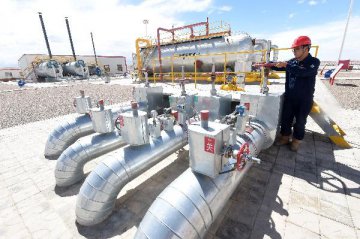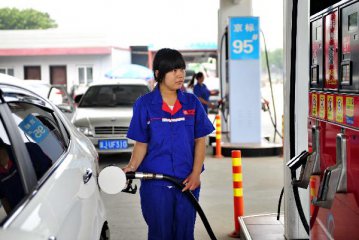NEW YORK, April 8 (Xinhua) -- Chinese fuel demand from cars would increase by around 20 percent by 2025 as strong sport utility vehicle (SUV) sales would more than offset substitution effect of electric vehicles (EVs), said a consultancy firm Thursday.
Chinese car sales have shifted to higher-grade and larger-size family cars due to rising income and the after-effects of the removal of one-child policy in 2015, said Lei Yujiao, a consultant with Wood Mackenzie, an Edinburgh-based global energy research and consultancy company.
The changing dynamics from the demand side has led to a shift toward a less fuel efficient car segment as the share of SUVs in total car sales reached 42 percent in 2018 from 6.6 percent a decade ago, said Lei.
The sales of SUVs didn't lose momentum in 2018 as Chinese overall car sales dipped 4 percent to 23.7 million units, posting the first year-on-year decrease in 28 years.
China is likely to see a surge in EV purchases in 2019 as the Chinese government is scheduled to phase out subsidies for the purchase of EVs in 2020, according to Lei.
China's yearly EV sales shot up by 90 percent in 2018, reaching 1 million units or 4 percent of the total car sales thanks to supportive policies, progress on mileage for single charge and availability of more models.
Lei added that Chinese automobile sales would return to growth in general in 2019 with the introduction of a new tax cut for automobile manufacturers and a growth of household income.
The impact of EVs on oil demand is more long-term in nature, as 2 million units of EV sales in 2018 only account for a slice of total automobile sales of almost 90 million units in the world, according to Wood Mackenzie.
Chinese oil consumption would peak in 2025 resulting from a high penetration of EVs and a wide use of high-speed trains, according to a report by Morgan Stanley in March 2019.
Chinese car sales have shifted to higher-grade and larger-size family cars due to rising income and the after-effects of the removal of one-child policy in 2015, said Lei Yujiao, a consultant with Wood Mackenzie, an Edinburgh-based global energy research and consultancy company.
The changing dynamics from the demand side has led to a shift toward a less fuel efficient car segment as the share of SUVs in total car sales reached 42 percent in 2018 from 6.6 percent a decade ago, said Lei.
The sales of SUVs didn't lose momentum in 2018 as Chinese overall car sales dipped 4 percent to 23.7 million units, posting the first year-on-year decrease in 28 years.
China is likely to see a surge in EV purchases in 2019 as the Chinese government is scheduled to phase out subsidies for the purchase of EVs in 2020, according to Lei.
China's yearly EV sales shot up by 90 percent in 2018, reaching 1 million units or 4 percent of the total car sales thanks to supportive policies, progress on mileage for single charge and availability of more models.
Lei added that Chinese automobile sales would return to growth in general in 2019 with the introduction of a new tax cut for automobile manufacturers and a growth of household income.
The impact of EVs on oil demand is more long-term in nature, as 2 million units of EV sales in 2018 only account for a slice of total automobile sales of almost 90 million units in the world, according to Wood Mackenzie.
Chinese oil consumption would peak in 2025 resulting from a high penetration of EVs and a wide use of high-speed trains, according to a report by Morgan Stanley in March 2019.






















Latest comments